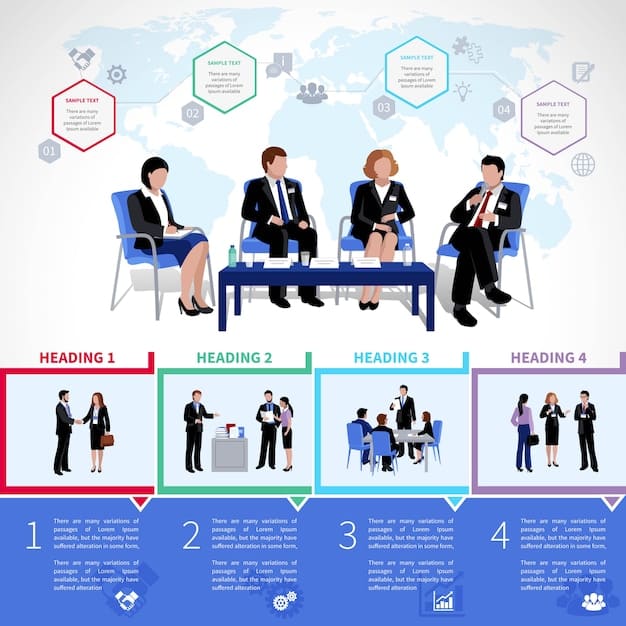Local Lobbying: Navigating New Restrictions for Advocacy Groups in 2025

Local lobbying is facing potential new restrictions in 2025, impacting how advocacy groups operate by requiring increased transparency, stricter compliance, and altered engagement strategies to align with evolving regulations.
The landscape of **local lobbying** is constantly evolving, and as we approach 2025, new restrictions are set to reshape the strategies and operations of advocacy groups. Understanding these changes is crucial for navigating local politics effectively. Let’s delve into what these new restrictions entail and how they will impact advocacy groups.
Understanding the Evolving Landscape of Local Lobbying
Local lobbying plays a crucial role in shaping policies at the municipal and county levels. It allows advocacy groups to voice their concerns, influence decision-making, and promote their agendas. However, the regulatory environment surrounding local lobbying is becoming increasingly complex.
New restrictions are emerging due to growing concerns about transparency, accountability, and potential conflicts of interest. These changes aim to ensure that lobbying activities are conducted ethically and openly, protecting the public interest.
Key Areas of Regulatory Change
Several key areas are experiencing regulatory changes that impact local lobbying efforts.
- Registration Requirements: More stringent registration requirements for lobbyists, including detailed information about their clients and activities.
- Disclosure Rules: Expanded disclosure rules regarding campaign contributions, gifts, and other forms of support provided to local officials.
- Ethics Oversight: Enhanced ethics oversight and enforcement mechanisms to prevent corruption and ensure compliance with regulations.

These regulatory changes reflect a broader trend toward greater transparency and accountability in government. They are designed to level the playing field and ensure that all voices are heard, regardless of their financial resources.
The Impact on Advocacy Groups
The new restrictions on local lobbying will have a significant impact on advocacy groups, requiring them to adapt their strategies and operations.
Compliance with these regulations may require additional resources, including legal counsel, compliance officers, and updated technology systems. Smaller advocacy groups with limited budgets may face particular challenges.
Adapting Advocacy Strategies
Advocacy groups need to adapt their strategies to remain effective in the face of new restrictions.
- Strengthening Grassroots Engagement: Focusing on grassroots engagement and building strong relationships with local communities.
- Enhancing Transparency: Being more transparent about their funding sources, activities, and goals.
- Collaborating with Other Groups: Collaborating with other advocacy groups to share resources and expertise.
By adapting their strategies, advocacy groups can continue to play a vital role in shaping local policies and promoting their agendas.
Navigating New Compliance Requirements
Navigating the new compliance requirements for local lobbying can be complex and challenging. Advocacy groups need to understand the specific regulations in their jurisdictions and implement effective compliance programs.
These programs should include clear policies and procedures, regular training for staff and volunteers, and robust monitoring and enforcement mechanisms.
Steps to Ensure Compliance
Here are some steps advocacy groups can take to ensure compliance with the new restrictions:
- Conduct a Comprehensive Risk Assessment: Identify potential compliance risks and develop mitigation strategies.
- Develop a Compliance Manual: Create a comprehensive compliance manual that outlines all relevant regulations and policies.
- Provide Regular Training: Provide regular training for staff and volunteers on compliance requirements.

Seeking legal counsel and working with experienced compliance professionals can also help advocacy groups navigate the complex regulatory landscape.
The Role of Technology
Technology plays an increasingly important role in local lobbying, enabling advocacy groups to communicate with local officials, track legislative developments, and engage with the public.
New technologies are emerging that can help advocacy groups automate compliance tasks, manage their data, and improve their outreach efforts.
Technological Solutions
Here are some examples of how technology can support local lobbying efforts:
- Lobbying Compliance Software: Software that automates registration, reporting, and disclosure requirements.
- Legislative Tracking Tools: Tools that track legislative developments and alert advocacy groups to relevant bills and regulations.
- Digital Advocacy Platforms: Platforms that enable advocacy groups to engage with the public and mobilize support for their causes.
By leveraging technology effectively, advocacy groups can streamline their operations, improve their compliance, and enhance their impact.
Building Stronger Community Engagement
In the face of new restrictions, building stronger community engagement is essential for advocacy groups to maintain their influence and achieve their goals.
Community engagement involves building relationships with local residents, understanding their concerns, and working together to find solutions to local problems.
Strategies for Community Engagement
Here are some strategies advocacy groups can use to strengthen their community engagement:
- Host Community Meetings and Events: Organize regular meetings and events to inform and engage local residents.
- Partner with Local Organizations: Collaborate with local organizations to amplify their message and reach a wider audience.
- Utilize Social Media: Use social media to connect with local residents, share information, and mobilize support for their causes.
By building strong relationships with local communities, advocacy groups can demonstrate their value and build trust with local officials.
Looking Ahead: Lobbying in 2025 and Beyond
As we look ahead to 2025 and beyond, local lobbying will continue to evolve in response to changing social, political, and technological forces.
Advocacy groups that are proactive, adaptable, and transparent will be best positioned to navigate the changing landscape and achieve their goals.
Future Trends in Local Lobbying
Here are some future trends to watch in local lobbying:
- Increased Emphasis on Transparency: Growing demand for greater transparency and accountability in lobbying activities.
- Rise of Data-Driven Advocacy: Greater use of data and analytics to inform advocacy strategies and measure their impact.
- Greater Scrutiny of Lobbyists: Increased scrutiny of lobbyists and their relationships with local officials.
By staying informed about these trends and adapting their strategies accordingly, advocacy groups can continue to play a vital role in shaping local policies and promoting their agendas.
Key Points | Brief Description
📢 Increased transparency requirements for lobbyists.
Detailed registration and disclosure of activities.
⚖️ Stricter compliance and enforcement.
Ensuring ethical lobbying practices.
🤝 Grassroots engagement importance.
Building strong community relationships.
📊 Technology for lobbying efforts.
Using software for compliance and data tracking.
What are the key changes impacting advocacy groups?
Lobbying restrictions increase challenges for all groups.
How can advocacy groups adapt to these restrictions?
By increasing grass roots engagement and collaborating.
What role does technology play in this new environment?
The role of technology streamlines operations and compliance.





